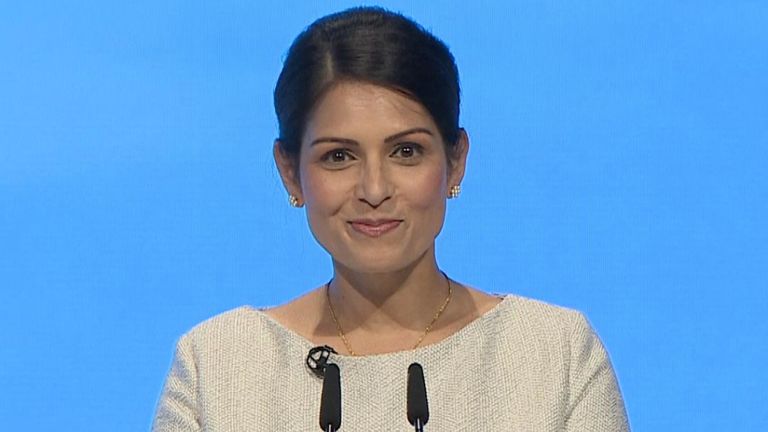For those who have read about the conditions that the captured ISIS prisoners are being kept in, there is a strong chance that you have also read about the fantasy prison conditions that lurk in the dark recesses of Priti Patel’s mind. Our current Home Secretary is not, by any stretch of the imagination, a reform-orientated minister. As her speech on Tuesday revealed, Patel has a very singular perspective on crime. It should be punished. And if that doesn’t work, punished harder.
That our current prison system is not working is tragically apparent. Our prisons have scraped by for decades, and are now creaking at the seams- some literally so. They are overcrowded, manned by a skeletal staff, and devoid of rehabilitative ambition. The former prisons minister, Rory Stewart, was engaged and progressive, interested in the policy and the data- not just what focus groups desired. He clearly wanted to improve prison conditions and move towards a model that would reduce recidivism, moving prisoners off a conveyor belt of crime. He is also no longer a member of the Conservative party. His liberal conservatism has been defenestrated, the policy of the carrot and the stick replaced with the stick alone.
The present conditions of the criminal justice system are not entirely because of flawed penal policy. The austerity programme meant that swingeing cuts were made across the board, and such cuts were always going to fall heaviest on the weak and the unpopular. And few are weaker or more unpopular in the political arena than prisoners.
Austerity is, however, not now at fault. As Sajid Javid’s speech to the Conservative Party Conference showed, this government is not averse to proving its largesse, throwing money around like a teenager who has just got access to his trust fund. Their interest is more in proving they have the money (and the will) to spend it- not actually ensuring they do anything useful with it.
The headline justice policy is that dangerous prisoners will not be eligible for release at the halfway point of their sentences, their eligibility for release to be withheld until they have served two thirds. This is a marked shift from the reformist agenda of David Gauke- another modernising minister late of the Conservative parish- who proposed the abolition of short sentences alongside a focus on rehabilitation, which would have potentially reduced the prison population by 50,000 a year- desperately needed, given that two thirds of our prisons are overcrowded, with many simply unfit for human habitation.
Gauke’s proposals actually engaged with the literature, consulting with experts on how to most effectively redress the UK’s painfully high reoffending rates – including a 60% reoffending rate for those sentenced to sentences of a year or less- and to turn prisoners into valuable members of society. Not only is this morally praiseworthy, but it is ultimately what the public wants. Brenda from Bristol doesn’t care how many people are locked up in Pentonville- she cares that when they come out, they don’t reoffend, or ideally, that they don’t offend at all.
Rather than this thoughtful approach, the latest headline-grabbing proposal of this populist government ignores the fact that extended sentences can already be imposed upon those convicted of the most violent offences, should the court think that it is necessary. Indeed, the Conservatives already made such sentences more punitive in 2012, removing the automatic release mechanism for these offenders at the two thirds point, requiring their release on licence to be authorised by the parole board. This latest change to sentencing will do nothing but remove what little discretion judges have left, forcing more prisoners into a one-size-fits-all sentence, and ignoring the data which suggests that mandatory sentences do nothing but further needlessly clog up prisons.
As a result of this policy, according to the government’s own figures, the prison population will go up by 3,000 inmates a year, at an increased cost of £100m. At a time when the courts are falling apart, trials are being delayed or cancelled, and legal aid is missing in action, there are significantly better places for this money to be spent in the criminal justice system.
The problem the government has here is that the people don’t want to see money spent in these areas. Not unreasonably, they think that longer, harsher sentences will deter criminals, as they wouldn’t want such punishment to happen to them.
But that is not how offending (and reoffending works). Rather than tell the people this, this government prefers to go along with them, as if reality can be changed provided you deny it for long enough. Thus, the government is pursuing a course of action that the experts say won’t work, the data says doesn’t work, but which will look good on the front page of the Sun.
 What makes this reform particularly tragic is that Buckland – and Johnson – know this. Buckland previously practised as a criminal barrister, and will be well aware that this policy is just throwing good money after bad.
What makes this reform particularly tragic is that Buckland – and Johnson – know this. Buckland previously practised as a criminal barrister, and will be well aware that this policy is just throwing good money after bad.
Johnson, meanwhile, is at least minimally aware that our prisons are falling some way short of expectations. In a now notorious column for the Telegraph earlier this year in which he not only ridiculed ‘our cock-eyed crook-coddling criminal justice system’ but acknowledged a justice system that was ‘too Dickensian’ with ‘squalid’ jails in which there is ‘hardly any real attempt, or capacity to re-educate and to reform’. The now prime minister also railed against the iniquity of day release for prisoners and defended stop and search as a non-racist policy, but it at least shows that there is some part of Johnson’s consciousness which knows that this sentencing policy is bunkum.
As ever, all columns must come back to Brexit. It is ultimately the government’s Brexit policy that has determined this course. To win the next election, whenever it happens, the Conservatives must attract the Leave vote in Labour heartlands- a group that favour left-wing economics and right-wing social policy.
Economics will not be enough, with McDonnell and Corbyn able to out-promise even the most profligate Conservative chancellor. This means social policy is the only option, one Johnson will try to seize with both hands. This policy merely continues the government’s retrograde agenda, harking back to a fantasy golden age where Britain’s coffers were full, prisoners learnt their lesson, and Britannia ruled the waves.







